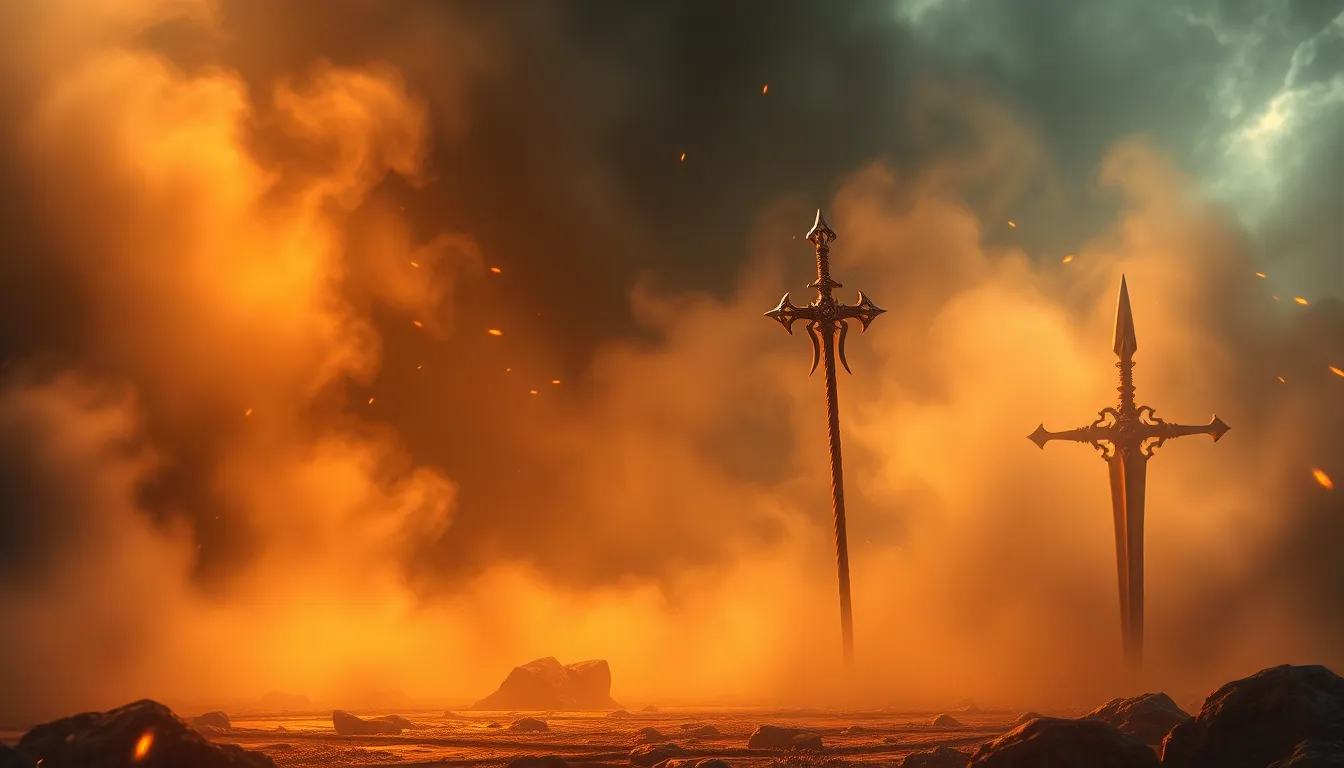The Mythological Arsenal: The Weapons That Shaped Legends
I. Introduction
Throughout history, weapons have not only served as tools of combat but also as potent symbols in mythology. They embody the power, authority, and ideals of the cultures from which they originate. Mythological weapons often play a pivotal role in shaping legends and cultural narratives, serving as catalysts for storytelling and moral lessons.
This article aims to explore the significance of these legendary arms across various mythologies, examining their characteristics, symbolic meanings, and the impact they have had on heroes and their quests. Through this exploration, we will uncover how these weapons have transcended time, influencing modern interpretations and cultural narratives.
II. The Concept of Mythological Weapons
Mythological weapons are not just mere objects of warfare; they are imbued with magical properties and deep significance. These arms often possess unique characteristics that set them apart from ordinary weapons:
- Magical Attributes: Many mythological weapons have supernatural abilities, such as the power to control elements or grant invincibility.
- Symbolism: They often represent broader concepts like justice, wisdom, or destruction, reflecting the values of the culture.
- Legendary Origins: These weapons frequently have rich backstories, often tied to the gods or significant historical events.
The symbolic meaning behind these legendary arms can vary widely. For instance, weapons can represent authority, as seen in the thunderbolt of Zeus, or embody the journey of a hero, like King Arthur’s Excalibur.
Unlike historical artifacts, which serve as tangible reminders of past societies, mythological weapons exist within the realm of the fantastical, often blurring the lines between reality and imagination.
III. Iconic Weapons in Greek Mythology
Greek mythology is replete with powerful weapons that shaped the narratives of gods and heroes alike. Among the most iconic are:
- Zeus’s Thunderbolt: As the king of the gods, Zeus wielded the thunderbolt, symbolizing his power and authority over gods and mortals. It was a weapon of justice and punishment, capable of delivering both protection and destruction.
- Poseidon’s Trident: The ruler of the seas, Poseidon, carried a trident that allowed him to control the oceans and create storms. It represents the untamable nature of the sea and the might of its god.
- Athena’s Shield (Aegis): Athena, the goddess of wisdom and warfare, bore the Aegis, a shield that offered protection and instilled fear in her enemies. It symbolizes the union of intellect and strength in battle.
IV. Norse Mythology: Weapons of the Gods
Norse mythology also features remarkable weapons that illustrate the virtues and struggles of its deities:
- Mjölnir: Thor’s hammer, Mjölnir, is a symbol of protection and power. It was not only a weapon but also a tool for blessing, representing the thunder god’s strength and his role as a protector of humanity.
- Gungnir: Odin’s spear, Gungnir, is said to never miss its target, symbolizing the inevitability of fate. It embodies the idea that destiny is unchangeable and that Odin, as the Allfather, guides the fates of all beings.
- Skofnung: Known as the legendary sword of Hrolf Kraki, Skofnung has magical properties that grant victory in battle. It represents the hero’s quest and the ideals of honor and bravery in Norse culture.
V. The Role of Weapons in Eastern Mythologies
Eastern mythologies also present powerful weapons with deep cultural significance:
- Kusanagi: The Kusanagi sword, one of Japan’s three Imperial Regalia, is associated with the god Susanoo and symbolizes valor and authority. Its origins are steeped in mythology, representing the triumph of good over evil.
- The Vajra: In Hinduism, the Vajra is a thunderbolt and a symbol of Indra’s power. It represents strength, protection, and spiritual enlightenment, signifying the duality of creation and destruction.
- The Spear of Destiny: This spear is steeped in myth, believed to have pierced the side of Christ. Various legends suggest it grants power over the world, representing the intertwining of faith and authority.
VI. Weapons in African Mythology
African mythology features a diverse array of weapons, each with unique meanings:
- The Lion’s Claw: Symbolizing strength and courage, the Lion’s Claw is revered in various cultures across Africa. It represents the majesty of the lion as the king of beasts and the qualities of leadership.
- The Swords of the Yoruba: These swords hold spiritual significance in Yoruba culture, often used in rituals and ceremonies. They embody the connection between the physical and spiritual worlds.
- Anansi’s Web: While not a physical weapon, Anansi’s web symbolizes intelligence and cunning. Anansi, the spider trickster, uses his wits as a weapon to outsmart foes, highlighting the power of intellect over brute strength.
VII. The Impact of Weapons on Heroes and Their Quests
Mythological weapons often play a crucial role in defining a hero’s journey:
- Defining the Hero: A hero’s weapon often reflects their personality and destiny, shaping their identity. For instance, Beowulf’s sword, Hrunting, represents his valor and the challenges he faces.
- Transformational Moments: The acquisition of a legendary weapon frequently marks a turning point in a hero’s journey, signifying growth and the acceptance of their fate.
- Case Studies: Legendary weapons such as Excalibur and Beowulf’s sword are central to their narratives, embodying their heroic status and the virtues they represent.
VIII. Contemporary Interpretations of Mythological Weapons
In modern culture, mythological weapons continue to inspire adaptations in various media:
- Literature: Many authors draw upon mythological themes, reimagining legendary arms in contemporary narratives.
- Film: Cinematic adaptations often showcase these weapons, bringing their stories to life for new audiences. Films like “Thor” and “Clash of the Titans” highlight these iconic arms.
- Video Games: The resurgence of interest in mythology is evident in video games, where players wield mythological weapons to accomplish heroic feats.
IX. The Psychological and Cultural Significance of Mythological Weapons
The exploration of mythological weapons reveals deeper themes of power, conflict, and identity:
- Themes of Power: Weapons symbolize authority and control, reflecting societal values and the nature of conflict.
- Moral Lessons: Many myths use weapons to convey moral lessons, illustrating the consequences of their use in the hands of good versus evil.
- Modern Perceptions: These myths continue to shape contemporary views of heroism and villainy, influencing how society perceives strength and righteousness.


